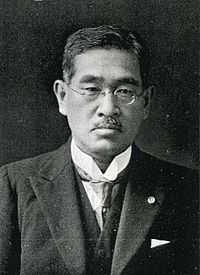Genji Matsuda
| Genji Matsuda 松田 源治 | |
|---|---|
|
Genji Matsuda | |
| Born |
October 4, 1876 Oita Prefecture, Japan |
| Died | February 2, 1936 (aged 59) |
| Nationality | Japan |
| Occupation | Lawyer, Politician, Cabinet Minister |
Genji Matsuda (松田 源治 Matsuda Genji , October 4, 1876 – February 1, 1936), was a politician and cabinet minister in the Empire of Japan, serving as a member of the Lower House of the Diet of Japan nine times, and twice holding cabinet-level posts.
Biography
Matsuda was born in Usa District, Oita prefecture, and was trained as a lawyer, graduating from the predecessor of Chuo University. He was first elected to the Lower House as a representative from Oita Prefecture in 1908. Joining the Rikken Seiyukai political party, he switched to the Seiyu Hontō in 1924, and Rikken Minseitō in 1927.
In October 1929, Matsuda was picked to be Minister of Colonial Affairs under the Hamaguchi administration, holding that post until April 1931. On July 8, 1934, he became Minister of Education under the Okada administration. During his tenure as Education Minister, he gained notoriety for a speech made on August 29, 1934 in which he blasted the use of the foreign words ‘mama’ and ‘papa’ by Japanese children when traditional Japanese words existed. The speech was widely reported in western media via Time Magazine, which also derided Matsuda for having previously stated that he was the "Lloyd George of the Far East" [1] Matsuda created further controversy in 1935, when he attempted to interfere in selection of works for display in the Niten Exhibition held by the Japan Art Academy.
Matsuda died in 1936. His grave is at the Tama Cemetery in Fuchū, Tokyo.[2]
References
| Wikimedia Commons has media related to Genji Matsuda. |
| Political offices | ||
|---|---|---|
| Preceded by Tanaka Giichi |
Minister of Colonial Affairs Oct 1929 - Apr 1931 |
Succeeded by Shūjirō Hara |
| Preceded by Makoto Saitō |
Minister of Education Jul 1934- Feb 1936 |
Succeeded by Takukichi Kawasaki |
